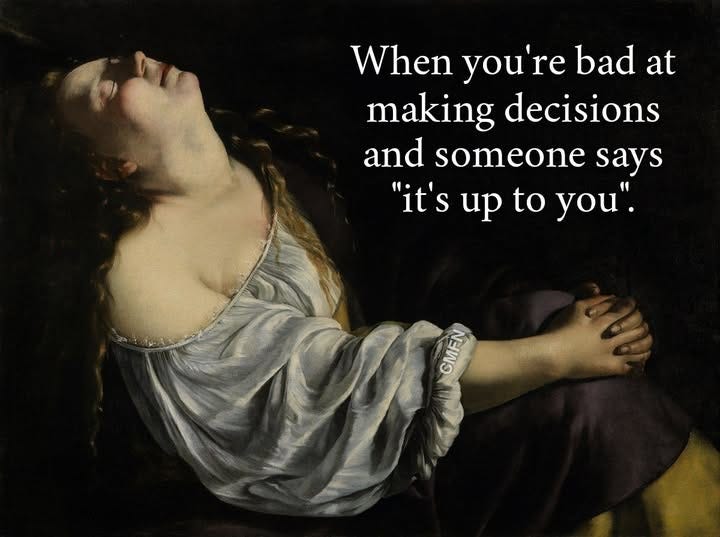to swither, to decide, to change
the myth of a decision that doesn't have any downsides
Hello! I thought I would start introducing myself at the start of my posts. I am Lauren McQuistin, a musician, the author of No Lost Causes Club and the creator behind @brutalrecovery. I write about recovery not as a before and after, but as an ongoing process of imperfectly growing up and learning what we missed the first time around.
As a paid subscriber you get access to every weekly upload (with more personal insights), the whole archive here and you can suggest topics for me to write about. Your support means I can keep writing, putting up free pieces and creating work with humour and hope for free on instagram. If you would like to join (and help me reach my goal of 50 paid subscribers) you can do so here:
Myself and my closest friends have all spent large portions of our 20’s living in different countries before settling into unconventional jobs, having made more than a few life-altering mistakes. We have loved fearlessly, followed where it led, and turned back when we needed to. We have made some very bad decisions, but at least, in some cases, that meant that we had a choice. From how we decorate our space to how we orientate our careers, today we treasure our choices, because a lot of us come from a long line of people who didn’t have any.
Though they could do the work well and could make something wonderful out of the cards they were dealt, not every woman in anyone’s ancestry wanted to be a mother, and not everyone in my family tree, made up of 100% farmers, wanted to be a farmer. My parents gave me and my siblings the choice to deviate from this lineage, and we made the decision to take a risk and do something different. It is the most precious gift they could have given us. We live very interesting lives as a result of every conscious, and sometimes unconscious, decision we have been able to make.
Some of my decisions were impulsivity in disguise, an inner sense of urgency always meant that I took action - often before I had a chance to think. Usually this happened in areas of my life that had some velocity in them, like a terrain laden with fear of financial insecurity, or anywhere that had a promise of dramatic release, or at least some plot development. My impulsivity was rarely purposed towards things that contributed to my wellbeing, unless there was a deal on the new ‘thing’ that was going to fix me, like a monthly massage subscription, some new exercise trend or a vitamin.
Getting sober was an outlier in this trend. I chose recovery in a moment of grace when something inside quietly told me that I was done. The decision felt like it was made for me, desperation humbled me and my mangled psyche, and though I was not excited about it - the way forward was clear. I was going to do the long, slow and hard thing, without the promise of a silver bullet.
However, I became indecisive in sobriety. I was prone to depression in the first two years, where rumination, pessimism and lack of motivation made me unwilling to make any choice that could contain the chance of feeling any worse. Everything became a risk, and the cycle continued. As time turned into experience, I achieved more stability. Here my indecisiveness changed shape, because I started to gain things I was scared to lose. My challenge moved from inertia to immobilisation - a strange sensation for a woman who moved from Scotland to Indiana when she was 21 to pursue a Masters degree based on a single compliment from a teacher who lived out there.
No matter how much I may swither (a word I recently realised was not universal, but Scottish, meaning to go between options) I have made the decision to do what I’ve needed to do to stay sober each day for the past seven and a half years. But the specific details of my life, the career, relationships and interests I have as a result of sobriety, create demands on me that I didn’t have on day one. If I am to show up for the life I fought for, I can’t lose myself in ‘I don’t know, I don’t know, I don’t know.’ I usually do know, I am often just a bit too frightened or lack the surge of inspiration or enthusiasm to work it out. ‘I don’t know’ is easier.
I can get stuck in a thought-trap here, where I start to convince myself of my inherent ineptitude, that at my centre is a void of nothing, going nowhere and I am built to fail. Psychologist Rollo May proposes another perspective in his book Love and Will. Using the example of the famous switherer, genius and occasional depressive, William James, May argues that his “difficulty in making up his mind was connected with his inner richness and the myriad of possibilities for him in every decision.”
Rather than potential futility or disaster, indecisiveness can be a symptom of wanting to fully explore, live in technicolour, neglecting none of the opportunities for seeing, experiencing and enjoying that are available during our short time here. Behind a barrier of fear is a desire to want to enjoy life, not hide from it. It’s hard to access that when you’re frightened. I wanted to become a more decisive person, and to trust my decisions, and this framing helped make a beginning.
The process of trusting yourself and deciphering the difference between intuition and knee-jerk fear responses requires a long period of experience and discernment. Alongside that process, there are some principles for decision making that have helped me.


